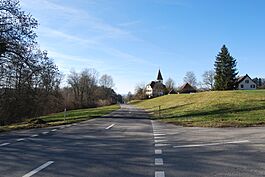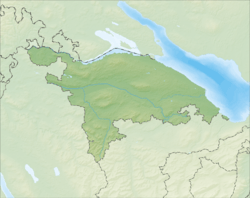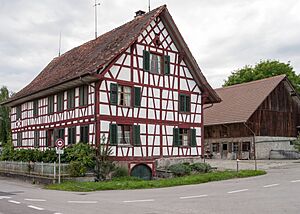Wäldi facts for kids
Quick facts for kids
Wäldi
|
||
|---|---|---|
 |
||
|
||
| Country | Switzerland | |
| Canton | Thurgau | |
| District | Kreuzlingen | |
| Area | ||
| • Total | 12.21 km2 (4.71 sq mi) | |
| Elevation | 610 m (2,000 ft) | |
| Population
(Dec 2020 )
|
||
| • Total | 1,055 | |
| • Density | 86.40/km2 (223.79/sq mi) | |
| Postal code |
8564
|
|
| Surrounded by | Ermatingen, Kemmental, Raperswilen, Tägerwilen, Wigoltingen | |
Wäldi is a small town, also called a municipality, in Switzerland. It is located in the canton of Thurgau, within the Kreuzlingen district.
Contents
Exploring Wäldi's Geography
Wäldi covers an area of about 12.23 square kilometers (4.72 square miles). This is roughly the size of 1,223 football fields! A big part of Wäldi's land, about 74.7%, is used for farming. This means there are lots of fields for growing crops.
About 16.8% of the area is covered by forests. These are important for nature and provide homes for animals. The remaining land, about 8.4%, has buildings and roads. A tiny part, 0.1%, is made up of rivers or lakes.
In 1995, two nearby villages, Lipperswil and Sonterswil, joined together with Wäldi. This made the municipality of Wäldi bigger.
Wäldi's Population and People
Wäldi has a population of about 1,000 people. As of 2008, a small part of the population, about 7.7%, were people from other countries. Over ten years, from 1997 to 2007, the number of people living in Wäldi grew by 6.1%.
Most people in Wäldi speak German, which is about 90.7% of the population. The second most common language is Polish, spoken by 1.4% of residents. About 1.2% of the people speak French.
In 2008, there were slightly more men than women living in Wäldi. About 52.5% of the population were male, and 47.5% were female.
The age groups in Wäldi are quite varied. In 2009, about 7.1% of the people were children aged 0 to 9 years old. Teenagers, aged 10 to 19, made up 15.1% of the population. Adults aged 20 to 59 make up the largest group, with people in their 40s being the biggest part of this group. Older adults, aged 60 and above, make up about 16.9% of the population.
Most households in Wäldi have about 2.5 people living in them. Many people live in single-family homes. About 56.2% of the people live in homes with a couple and their children.
Wäldi's Political Choices
In the 2007 federal election, the most popular political party in Wäldi was the SVP. They received 63.57% of the votes. The Green Party was the second most popular, followed by the FDP and the CVP. About 52.9% of the people who could vote actually did vote in that election.
Historical Population Trends
Here's how Wäldi's population has changed over the years:
| year | population |
|---|---|
| 1950 | 818 |
| 1960 | 830 |
| 1980 | 704 |
| 1990 | 789 |
| 2000 | 970 |
Wäldi's Economy and Jobs
Wäldi has a low unemployment rate, which means most people who want to work can find a job. In 2007, the unemployment rate was 1.37%.
Many people in Wäldi work in different types of jobs:
- Primary sector: This includes jobs like farming and forestry. About 123 people work in this area, with 50 businesses.
- Secondary sector: This involves manufacturing and construction. There are 105 people and 18 businesses in this sector.
- Tertiary sector: This covers services like shops, offices, and tourism. About 240 people work here, with 30 businesses.
Many people who live in Wäldi travel outside the municipality for work. In 2000, about 42.7% of residents worked in other towns. However, 160 people also travel into Wäldi for their jobs. Most people use a private car to get to work (47.7%), while a smaller number (4.5%) use public transportation.
Religion in Wäldi
Based on the 2000 census, most people in Wäldi belong to a Christian church. About 60.4% are part of the Swiss Reformed Church, and 16.0% are Roman Catholic. A small number of people, about 3.30%, belong to other Christian churches.
There are also a few people who are Islamic, making up about 0.62% of the population. Some people (8.25%) do not belong to any church, and some did not answer the question.
Education in Wäldi
Education is important in Wäldi. About 66.6% of adults aged 25 to 64 have completed higher education. This means they have either finished upper secondary education (like high school) or gone on to university or a specialized college (a Fachhochschule).
See also
 In Spanish: Wäldi para niños
In Spanish: Wäldi para niños
 | Victor J. Glover |
 | Yvonne Cagle |
 | Jeanette Epps |
 | Bernard A. Harris Jr. |





